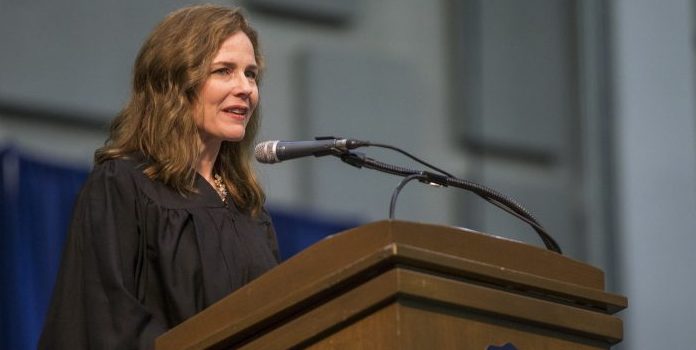(Headline USA) At a rally late Tuesday in Pittsburgh, Trump told supporters how surprised he was in 2016 over voter reaction to the Supreme Court.
That February, just before a crucial presidential primary debate in South Carolina, the sudden death of conservative Justice Antonin Scalia sent shockwaves through Washington.
Republicans remember the moment well: Trump on the debate stage started naming possible replacements.
It was a jaw-dropping instant for advocates who have been working to restructure the courts since the Reagan era. And all the more stunning from Trump, a newcomer to politics who had supported abortion just years earlier but was now naming conservative judicial champions.
“I was like, wow, I didn’t see that coming,” said Carrie Severino, president of the conservative advocacy group Judicial Crisis Network.
Now as Republicans strain to hold their slim majority in the Senate, they believe another court battle in the countdown weeks to the 2020 election will similarly bring wayward Trump voters back into the fold—or at least they’ll go down in defeat having secured the long-sought goal.
Despite Democrats’ threats—including the possibility of arson and violence—they’re hoping the battle over filling the seat left vacant by the late Ruth Bader Ginsburg will help them keep their Senate majority as well as Trump’s job in the White House.
Beyond the Nov. 3 elections, faced with a radical Left that has sought to leverage judicial activism to undermine some of the nation’s most basic founding principles, some feel the generational goal of a solidly conservative court is worth the fight.
“Most of us came to the Senate, ran for the Senate, in a lot of ways for big moments like this—for an opportunity to fill seats on the Supreme Court,” said Sen. John Thune, R-S.D., the GOP whip who is not up for reelection this year.
Whatever their personal views of Trump and his presidency, Republicans also see a political payoff in sticking with him and plunging ahead to confirm his pick to fill the court vacancy before the election.
By Wednesday, they were preparing for confirmation hearings as soon as Oct. 12, with a possible full Senate vote Oct. 29. Trump is to announce his choice Saturday.
“The process is going to go very quickly,” Trump said at the White House.
The president suggested doing away with confirmation hearings, and said later he wants the new justice confirmed before the election. “It’s better,” he said about the timing.
Democrats, led by presidential nominee Joe Biden, continued to complain that Senate Majority Leader Mitch McConnell led Republicans in refusing to consider a nominee of President Barack Obama nominee in February 2016, long before that year’s election.
Although several recent justices have been confirmed in a shorter period of time, no Supreme Court nominee has been confirmed by the Senate so close to balloting.
But Republicans sense a reward greater than risk.
“It’s a really exciting time,” said Severino. “This is a new era.”
The top contender for Trump’s nomination is Amy Coney Barrett, a judge of the 7th U.S. Circuit Court of Appeals in the Midwest, though the president may also meet Friday with Judge Barbara Lagoa in battleground Florida.
There’s little the Democrats can do to block it. The Senate is controlled by Republicans, 53-47, with a simple majority needed for confirmation. Under Senate rules, Vice President Mike Pence can break a tie.
In contrast with Trump, whose list of potential justices in 2016 helped reassure uneasy conservatives, Biden had avoided saying whom he would hypothetically pick.
His own Democrat base remains sharply divided between traditional establishment liberals and extreme progressives, who have actively embarked upon pressure campaigns to fill the court with like-minded radicals.
Biden has hinted at the possibility of packing the court by adding additional left-leaning justices if elected, raising the stakes of the November race even higher.
It also may open up a Pandora’s box that would see future presidents continue piling on even more of the lifetime appointed federal jurists.
Some moderate Democrats see that as a losing issue. Sen. Doug Jones, D-Ala., whose seat is considered to be among the most vulnerable in the coming election, this week proposed a constitutional amendment to prevent future court-packing.
For vulnerable Republicans facing similar prospects, on the other hand, the court battle offers the prospect of a fresh jolt of enthusiasm.
One by one, GOP senators facing tough reelections—Martha McSally in Arizona, Thom Tillis in North Carolina, Steve Daines in Montana and Joni Ernst in Iowa—all threw their support behind voting on Trump’s choice.
Sen. Lindsey Graham, the chairman of the Judiciary Committee who faces his own tough race in South Carolina, estimated it will help him in win.
Even in Colorado, where the blue-trending politics are more uncertain, Sen. Cory Gardner joined the push for a new justice—better to be seen as part of the movement, despite the political risks.
“These sorts of fights bring Republicans together,” said Sen. Todd Young, R-Ind., the party’s Senate campaign chairman.
Adapted from reporting by the Associated Press

